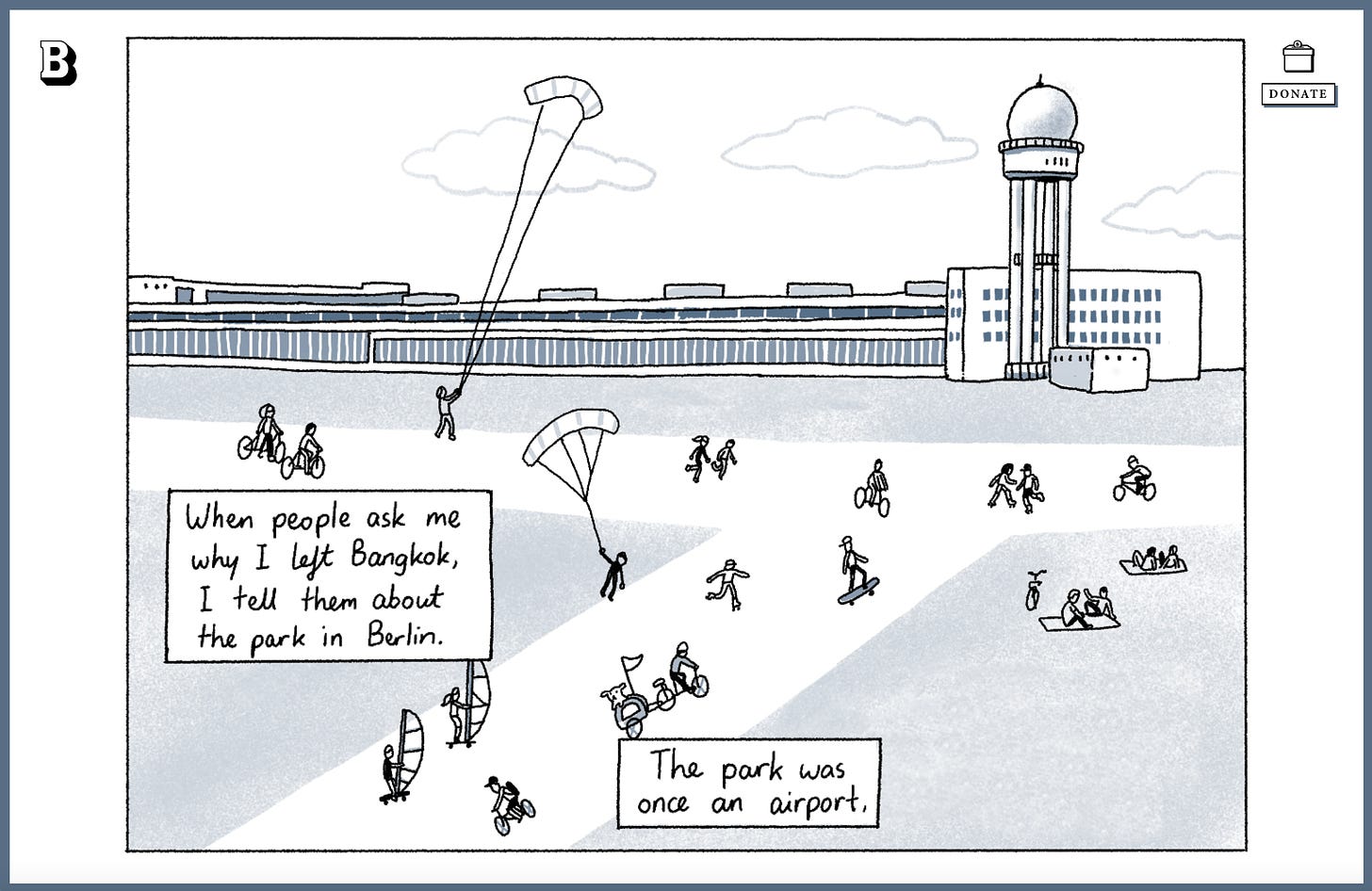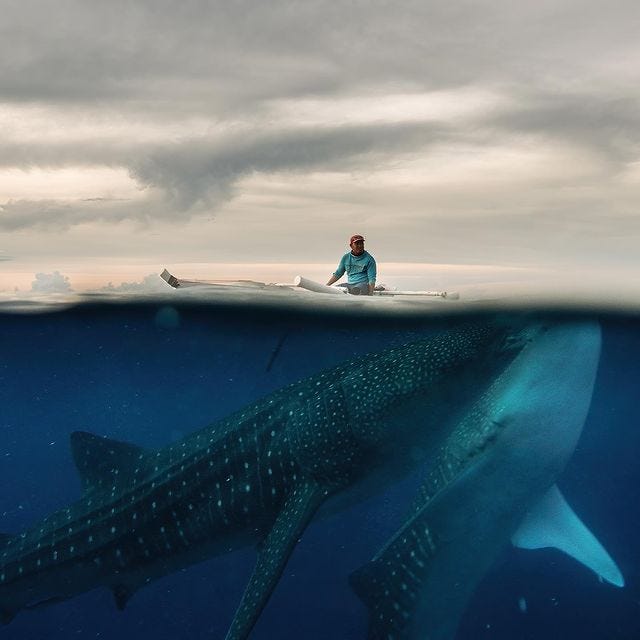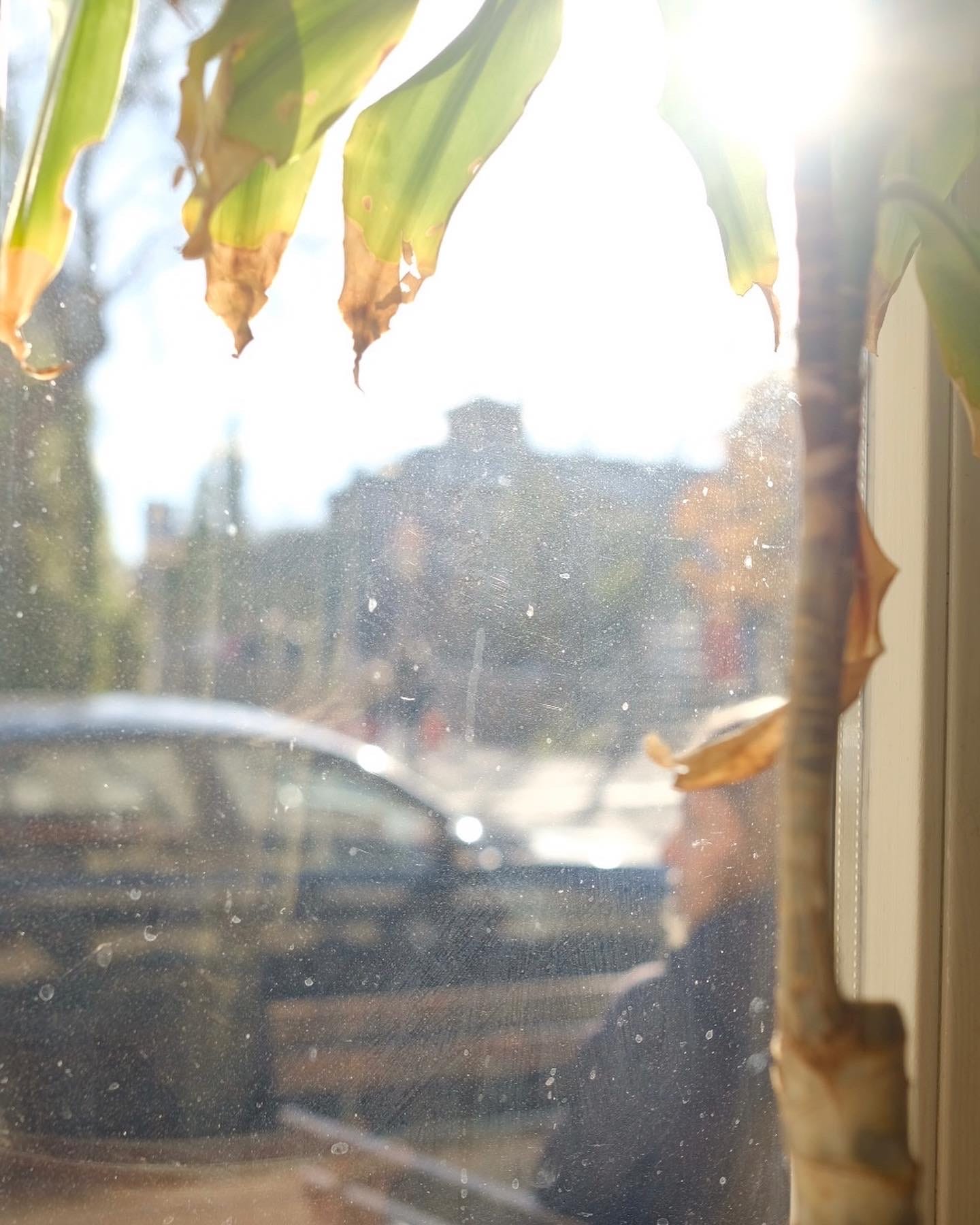From the long-anticipated third novel (interesting take here) by Sally Rooney:
All my feelings and experiences were in one sense extremely intense, and in another sense completely trivial, because none of my decisions seemed to have any consequences, and nothing about my life—the job, the apartment, the desires, the love affairs—struck me as permanent. I felt anything was possible, that there were no doors shut behind me, and that out there somewhere, as yet unknown, there were people who would love and admire me and want to make me happy. Maybe that explains in some way the openness I felt towards the world—maybe without knowing it, I was anticipating my future, I was watching for signs.
—Sally Rooney, Beautiful World, Where Are You?
Friends,
You’ll notice that I’ve changed the overarching name of this newsletter to Movable Worlds; I gave “The Great Affair” over to the guest section. I wanted something that could more readily encompass the idea of a world in flux, a world capable of change, and—riffing on Hemingway’s moveable feast—the inner worlds of our own making that we carry with us wherever we go. I thought the name change would also better embrace some other ideas I have for the newsletter—but more on that in another dispatch. You can still reach this newsletter at its old URL, which will simply redirect to movableworlds.substack.com
Anyway, I hope you enjoy this month’s curated letter. As always, feel free to let me know your thoughts.
Making sense of our place in the world
Tiki Girl by Amanda Lee Koe—fairly sure this is nonfiction, but even if it’s not, I love the spot-on vibes this scene conjures up!
More often than not, when Bud stepped off Bus 10, she would be in a cosy sweater. Aircon on those double-decker night buses was extra frigid, but on alighting, the streets were balmy again. I would hold her T-shirt down as she removed her sweater. Then we’d walk to my favourite neighbourhood kopitiam, where the Mainland Chinese drinks stall lady with a frizzy perm knew my order: I’d start with a cold teh c peng and end with a warm Milo. She was friendly to me, unlike the Singaporean Chinese beer auntie in an ass-hugging Tiger-Beer skort who only bussed the tables of bawdy uncles who started every sentence with ‘Kanina’, the Hokkien equivalent of ‘Fuck you’. From what I could hear, they seemed to be using this merely as a placeholder for ‘Let me tell you…’ and the appropriate response once someone had finished relaying his anecdote was a hearty chorus of ‘Lan pa!’, the Hokkien for testicles, which appeared to connote ‘No way!’
My Accidental Visit to the Pandemic’s Party Capital by Rosa Lyster and Gueorgui Pinkhassov, which I love for how closely it hews, in feeling if not necessarily in its material facts (at the risk of sounding square, I am not much of a clubber), to my own experience of growing to love the places I’ve loved:
Becoming abruptly besotted with a new city can be like falling dramatically in love with a new person, and much of it rests on the sense of elated mystification that is unsustainable in the long term—if you walked around swooning at coincidences like this all the time, you would fall in a hole or become unemployed—but it is also one reason the species continues to thrive. The difference between a city and a person is that a city can’t love you back, but Kyiv frequently gives the impression that it is trying, in that it instantly repays whatever attention you might lavish upon it. It is a city of hidden courtyards and underpasses and bars that you come across by mistake, all of which enables a sense of personal ownership over discoveries everyone has already made. This still isn’t a reason. I can’t say why Kyiv knocked me out the way it did any more than I could objectively account for why and when I fell in love, other than to establish for the record that a feeling of instant affinity is still possible, where matters progress with a speed both astonishing and inevitable.
American Spit by Malaysian writer Vanessa Chan—very short, very punchy:
You roll your eyes at me in bed, sigh with the resignation of someone who feels the burden of civility resting on your thin shoulders.
“No, babe. It’s ‘con-TEM-pla-tive not ‘con-tem-PLAY-tive.’ You said it wrong again.”
You are Asian too, but American, and this makes all the difference. It means that you know how to use filler words like like in the right places, even if you don’t seem to like anything about me these days.
Making House: Notes on Domesticity by Rachel Cusk:
Not long before, I was driven to what appeared to be the brink of mental and physical collapse by embarking on the complete remodeling of our London flat, and while it was true that my children and I were now enjoying the benefits of living in a more pleasant environment, I still felt a certain sense of shame at how determinedly I brought these events about. I caused walls to be knocked down and floors to be ripped up and rooms to be gutted; I threw away decades’ worth of clutter and keepsakes and old furniture; with what at times seemed like magic and at others sheer violence, I caused the past to be obliterated and put something new, something of my choosing, in its place.
The Places We Lost, an illustrated comic by Kathy MacLeod (from Believer magazine—which, very sadly, will cease publishing in 2022):
Making sense of a world at once quotidian, absurd, brutal, poignant, and extraordinary
On migration
How Africa will become the center of the world’s urban future by Max Bearak, Dylan Moriarty, and Júlia Ledur
The Migrant Workers Who Follow Climate Disasters by Sarah Stillman
Brain Drain From Britain Delivers Financial Boon to Estonia by Stephen Castle
A once-remote patch of rainforest is now packed with migrants trying to reach the U.S. by John Otis
Why Belarus is using migrants as a political weapon by Ellen Iones
On culture, conflict, etc.
What happened to the women who stayed behind in Afghanistan, from a photo essay by Laura King and Marcus Yam. “Unlike many Afghan women, Sahar didn't lose her job when the Taliban returned to power. But something has changed: She has to pretend that a man is the one doing her work.”
Why Japan Can’t Bring Itself to Ban Sexual Depictions of Children in Manga by Hanako Montgomery. “Some also argue that children who grow up seeing this unregulated media could think it acceptable to be sexualized, even making them susceptible targets of sexual grooming by perpetrators of child sex crimes.”
The global streaming boom is creating a severe translator shortage by Andrew Deck. Quoting Paolo Sigismondi, a professor who researches the global entertainment industry, “Squid Game is another sign that there is a demand for locally produced media entertainment content above and beyond local audiences—for Korean content outside of Korea, for Mexican content outside of Mexico.”
The Secret Oral History of Bennington: The 1980s’ Most Decadent College by Lili Anolik. Quoting Donna Tartt, of The Secret History fame: “[E]verybody there was like the oddly gifted person who made bad grades and hung out in the parking lot.” Also appearances by Bret Easton Ellis and Jonathan Lethem. The story is relevant again because of a new podcast by the same writer.
Global Hunt for Looted Treasures Leads to Offshore Trusts, by journalists at the Washington Post, as part of the Pandora Papers exposé—and what it turned up about the religious artifacts Cambodia wants returned to it. “This led to a broader examination of the global trade in art, a realm in which shell companies and trusts conceal smuggling, and some famed institutions and private collectors buy items of murky origin.”
Terror & tourism: Xinjiang eases its grip, but fear remains by Dake Kang. “Many of the practices that made the Uyghur culture a living thing—raucous gatherings, strict Islamic habits, heated debate—have been restricted or banned. In their place, the authorities have crafted a sterilized version, one ripe for commercialization.”
In Texas, where legislators have passed a bill to usher in a future without abortion rights, a maternity ranch is born, by Stephanie McCrummen. Uh, to quote the founder: “What if Texas ends up becoming a model for the future? What if Texas meets this shift in culture? And instead of having high abortion rates, what if we help single moms to become stronger moms, to become successful?”
Spätis: The convenience stores that rule Berlin by Krystin Arneson. “They supply locals and tourists with cigarettes, snacks and €1 after-work wegbiers ("beers you drink on the go"). But during the pandemic, and particularly during the warmer months, they became essential fuelling stations for outdoor gatherings, as shuttered bars and nightclubs turned social life inside out.”
After Rittenhouse: Will deadly clashes multiply as the right to self-defense expands? by Mark Fischer and Mark Berman. “Under Wisconsin law, people who perceive a threat to their life don’t have a duty to run away. Such laws are designed to give armed citizens the flexibility to shoot first and ask questions—or be challenged on their decision in a courtroom—later.”
The Thrilling Dare of Scorched Rice by Ligaya Mishan. “To turn a mistake into a virtue, to recast dregs as bounty, to make a gift, an honor, of something that would once have been cursed at and cast aside: Is it possible that this says less about resilience and more about the sheer perversity—and generosity—of human nature, which leads us so often to seek the good in the bad, to favor the damaged, to love the flaw?”
On climate change & the natural world
Got to delve into the history of the Nipah virus outbreak in Malaysia for a story I contributed reporting to: How the hunt for this deadly virus shaped the search for coronavirus’s origins by Karin Brulliard and Ben Guarino. “By 1998, Malaysia had undergone an economic boom that led to a greater demand for meat, and more forests cut for agriculture. Some pig farms, previously a backyard industry, had tens of thousands of animals. Some farmers supplemented their income with fruit orchards, planting trees next to open-air pigsties—perfect flying fox buffets."
Please Don’t Feed the Whale Sharks? Fishing Town Says It Must, to Prosper, by Hannah Reyes Morales:
“Where have you been?” Mr. de Guzman asks 180, whom he hasn’t seen in weeks, as he drops handfuls of shrimp into the water and gently scrapes off some debris from the shark’s body. “You must have traveled to a far-off place.”
How Americans’ Appetite for Leather in Luxury SUVs Worsens Amazon Deforestation by Manuela Andreoni, Hiroko Tabuchi, Albert Sun, and Victor Moriyama. “Amazon deforestation has surged in recent years as ranchers race to supply the growing demand for beef, particularly in China. Leather industry representatives make the point that as long as there is demand for beef, they are simply using hides that would otherwise be sent to landfills.”
Countries’ climate pledges built on flawed data, Post investigation finds—particularly damning of my home country. “Malaysia’s latest catalog of its greenhouse gas emissions to the United Nations reads like a report from a parallel universe. The 285-page document suggests that Malaysia’s trees are absorbing carbon four times faster than similar forests in neighboring Indonesia.”
The Money Farmers: How Oligarchs and Populists Milk the E.U. for Millions by Selam Gebrekidan, Matt Apuzzo, and Benjamin Novak. “They have created a modern twist on a feudal system, giving jobs and aid to the compliant, and punishing the mutinous. These land barons, as it turns out, are financed and emboldened by the European Union.”
A view of home
How The Pakatan Harapan legend crumbled in Malacca by Bridget Welsh: “The opposition stalwart and prime minister hopeful [Anwar Ibrahim] has consistently failed to secure a major election victory at the leadership helm. How many times does he need to be rejected before the opposition realizes that Anwar’s time has passed?”
Singapore court orders temporary reprieve for mentally disabled man on death row by Shibani Mahtani—“Exacerbating the pain for Dharmalingam’s Malaysia-based family are travel restrictions that have made it challenging and isolating for his family to see him in person and say goodbye.” But that is not the end.
Of Putrajaya, Amnesic Utopias, and The City of Omelas by Lily J.: “What are the terms that a city like Putrajaya must accept, in order to remain pristine? Primarily, it must remain an amnesic city, constantly forgetting the country around it, and the history that existed before it. It’s a city of erasures.”
Reimagining our world
The elephant who could be a person by Jill Lepore—“the most important animal rights case of the 21st century”.
EU aims to curb deforestation with beef and coffee import ban by Jennifer Rankin—“for the first time the EU will attempt to regulate products linked to all—and not just illegal—deforestation.”
The lettings agency that's exclusively for homeless people by Lauren Brown
New York City is building a wall of oysters to fend off floods by Julia Hotz
The German Greens are proposing a Europe-wide network of sleeper trains, by Frank Jacobs. (Found this in Lauren Razavi’s Counterflows newsletter about borderless living.)
Something to think about
Anne Helen Petersen, who writes the Culture Study newsletter, on what community means:
You can show up for others, which can mean so many different things. You can talk to people you don’t know, which can take many other different forms. You can give alms willingly and without expectations. But most of these things involve taking time away from the concentration on your own to-do list. Community is showing up to weed the library garden even though it’s on a Saturday and you like a certain routine for your Saturday. It is actually joining the volunteer fire department. It is committing to a two-hour-a-week volunteer spot even though it feels weird because you’ve learned to dedicate all hours to work, and then blocking it off the same way you would block off any other commitment. It is offering assistance before it is asked for, even if it means camouflaging it in the form of “I’m going to the store, can I pick anything up for you?” It is having conversations that go nowhere even when you have dinner to start. It is unlearning so much of what many of us have taught ourselves about making every moment of our lives as efficient and optimized as possible.
Before I go, a sound postcard: after a late breakfast one weekend, while it was crisp cold and sunny outside, W.C. and his younger brother filling their childhood home with music:
A reminder that this dispatch is split into two parts. The second is here.
Thanks, as always, for reading. If you’ve enjoyed this newsletter, found it illuminative in any way, tell someone you know to subscribe.
Love,



















Landmarkings #8.1